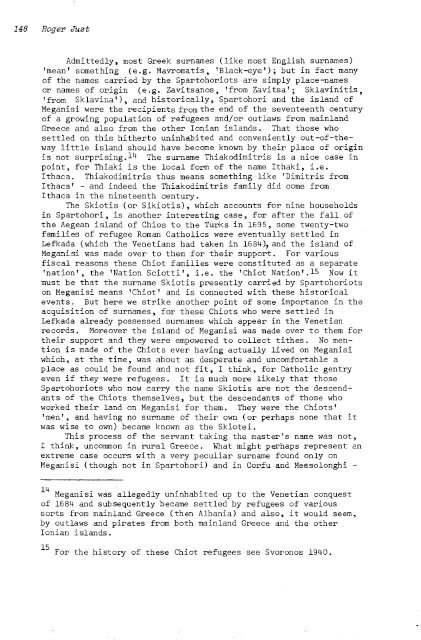CONTENTS NO.I - Institute of Social and Cultural Anthropology ...
CONTENTS NO.I - Institute of Social and Cultural Anthropology ...
CONTENTS NO.I - Institute of Social and Cultural Anthropology ...
You also want an ePaper? Increase the reach of your titles
YUMPU automatically turns print PDFs into web optimized ePapers that Google loves.
148 Roger Just<br />
Admittedly, most Greek surnames (like most English surnames)<br />
'mean' something (e.g. Mavromatis, 'Black-eye'); but in faGt many<br />
<strong>of</strong> the names carried by the Spartohoriots are simply -names<br />
or names <strong>of</strong> origin (e.g. Zavitsanos, 'from Zavitsa'; Sklavinitis,<br />
'from Sklavina'), <strong>and</strong> historically, Spartohori <strong>and</strong> the isl<strong>and</strong> <strong>of</strong><br />
Meganisi were the recipients from the end <strong>of</strong> the seventeenth century<br />
<strong>of</strong> a growing population <strong>of</strong> refugees <strong>and</strong>/or outlaws from mainl<strong>and</strong><br />
Greece <strong>and</strong> also from the other Ionian isl<strong>and</strong>s. That those who<br />
settled on this hitherto uninhabited <strong>and</strong> conveniently out-<strong>of</strong>-theway<br />
li t.tle isl<strong>and</strong> should have become known by their place <strong>of</strong> origin<br />
is not surprising.14 The surname Thiakodimitris is a nice case in<br />
point, for Thiaki is the local form <strong>of</strong> the name Ithaki, i.e.<br />
Ithaca. Thiakodimitris thus means something like 'Dimitris from<br />
Ithaca' - <strong>and</strong> indeed the Thiakodimitrisfamily did come from<br />
Ithaca in the nineteenth century.<br />
The Skiotis (or Sikiotis), which accounts for nine households<br />
in Spartohori, is another interesting case, for after the fall <strong>of</strong><br />
the isl<strong>and</strong> <strong>of</strong> Chios to the Turks in 1695, some twenty-two<br />
families <strong>of</strong> refugee Roman Catholics were eventually settled in<br />
Lefkada (which the Venetians had taken in 1684), <strong>and</strong> the isl<strong>and</strong> <strong>of</strong><br />
Meganisi was made over to them for their support. For various<br />
fiscal reasons these Chiot families were constituted as a separate<br />
'nation', the 'Nation Sciotti', i.e. the 'Chiot Nation' .15 Now it<br />
must be that the surnameSkiotis presently carried by Spartohoriots<br />
on Meganisi means 'Chiot' <strong>and</strong> is connected with these historical<br />
events. But here we strike another point <strong>of</strong> some importance in the<br />
acquisition <strong>of</strong> surnames, for these Chiots who were settled in<br />
Lefkada·already possessed surnames which appear in the Venetian<br />
records. Moreover the isl<strong>and</strong> <strong>of</strong> Meganisi was made over to them for<br />
their support <strong>and</strong> they were empowered to collect tithes. No mention<br />
is made <strong>of</strong> the Chiots ever having actually lived on Meganisi<br />
which, at the time, was about as desperate <strong>and</strong> uncomfortable a<br />
place as could be found <strong>and</strong> not fit, I think, for Catholic gentry<br />
even if were refugees. It is much more likely that those<br />
Spartohoriots who now carry the name Skiotis are not the descendants<br />
<strong>of</strong> the Chiots themselves, but the descendants <strong>of</strong> those who<br />
worked their l<strong>and</strong> on Meganisi for them. They were the Chiots'<br />
'men', <strong>and</strong> having no surname <strong>of</strong> their own (or perhaps none that it<br />
was wise to own) became known as the Skiotei.<br />
This process <strong>of</strong> the servant taking the master's name was not,<br />
I think, uncommon in rural Greece. What might perhaps represent an<br />
extreme case occurs with a very peculiar surname found only on<br />
nc~a.u~si (though not in Spartohori) <strong>and</strong> in Corfu <strong>and</strong> Messolonghi -<br />
14 n~5u,u~si was allegedly uninhabited up to the Venetian conquest<br />
<strong>of</strong> 1684 <strong>and</strong> subsequently became settled by refugees <strong>of</strong> various<br />
sorts from mainl<strong>and</strong> Greece (then Albania) <strong>and</strong> also, it would seem,<br />
by outlaws <strong>and</strong> pirates from both mainl<strong>and</strong> Greece <strong>and</strong> the other<br />
Ionian isl<strong>and</strong>s.<br />
15 . f .<br />
For the hlstOry 0 these ChlOt refugees see Svoronos 1940.

















